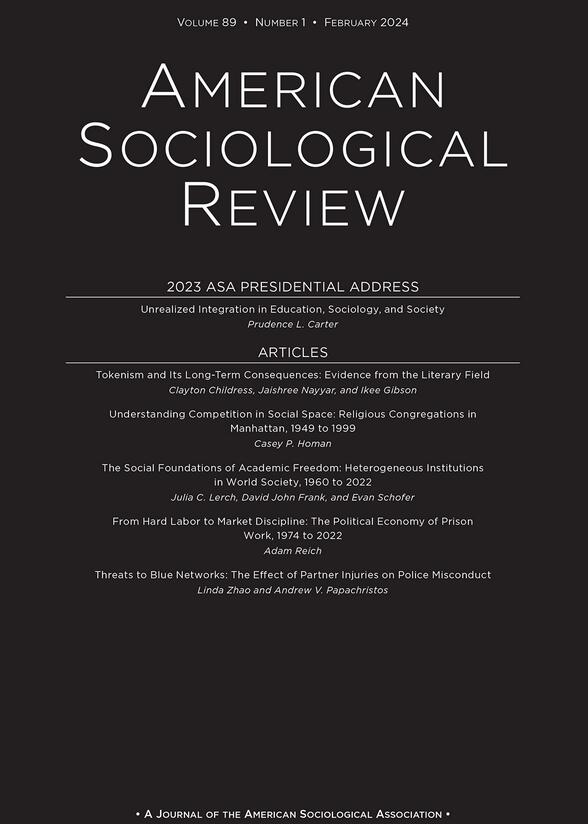联想扩散的复杂性——兼论网络结构与文化变异的关系
IF 6.2
1区 社会学
Q1 SOCIOLOGY
引用次数: 0
摘要
Goldberg和Stein(2018)提出了一个创新的基于主体的计算模型,该模型显示了文化关联如何通过表面的人际互动传播。他们反直觉地认为,分段网络——例如,那些类似于“小世界”的密集的局部集群——抑制而不是促进文化传播。这一发现是值得注意的,因为它打破了一长串有影响力的研究,这些研究表明,在行为和实践(包括文化信仰)需要多重强化才能传播的情况下,局部集群对传播至关重要。复制Goldberg和Stein的模型,我们发现这个结果只在近似小团体互动的情况下才一致。在人口较多的模型中,文化关联需要通过社会观察反复强化,局部聚集的小世界网络可以促进全球文化变异和全球连接网络,有时效果更好。在Goldberg和Stein的模型中,导致这种逆转的参数之间复杂的相互作用对人际影响的理论模型具有指导意义。本文章由计算机程序翻译,如有差异,请以英文原文为准。
The Complexity of Associative Diffusion: Reassessing the Relationship between Network Structure and Cultural Variation
Goldberg and Stein (2018) present an innovative agent-based computational model that shows how cultural associations can diffuse through superficial interpersonal interactions. They counterintuitively argue that segmented networks—for example, those resembling “small worlds” with dense local clustering—inhibit rather than promote cultural diffusion. This finding is notable because it breaks with a long line of influential research showing that local clustering is crucial to diffusion in cases where behaviors and practices—including cultural beliefs—require multiple reinforcements in order to spread. Replicating Goldberg and Stein’s model, we find this result only holds consistently in settings approximating small-group interactions. In models with larger populations, and where cultural associations require repeated reinforcement through social observation, locally clustered small-world networks can promote global cultural variation as well as globally-connected networks, and sometimes do so better. The complex interactions among parameters that lead to this reversal in Goldberg and Stein’s model are instructive for theoretical models of interpersonal influence.
求助全文
通过发布文献求助,成功后即可免费获取论文全文。
去求助
来源期刊

American Sociological Review
SOCIOLOGY-
CiteScore
13.30
自引率
3.30%
发文量
35
期刊介绍:
The American Sociological Association (ASA) is a non-profit membership association established in 1905. Its mission is to advance sociology as a scientific discipline and profession that serves the public good. ASA is comprised of approximately 12,000 members including faculty members, researchers, practitioners, and students in the field of sociology. Roughly 20% of the members work in government, business, or non-profit organizations.
One of ASA's primary endeavors is the publication and dissemination of important sociological research. To this end, they founded the American Sociological Review (ASR) in 1936. ASR is the flagship journal of the association and publishes original works that are of general interest and contribute to the advancement of sociology. The journal seeks to publish new theoretical developments, research results that enhance our understanding of fundamental social processes, and significant methodological innovations. ASR welcomes submissions from all areas of sociology, placing an emphasis on exceptional quality.
Aside from ASR, ASA also publishes 14 professional journals and magazines. Additionally, they organize an annual meeting that attracts over 6,000 participants. ASA's membership consists of scholars, professionals, and students dedicated to the study and application of sociology in various domains of society.
 求助内容:
求助内容: 应助结果提醒方式:
应助结果提醒方式:


